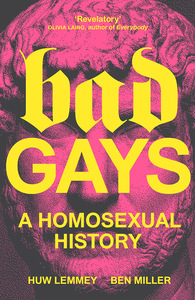You need to sign in or sign up before continuing.
Take a photo of a barcode or cover
challenging
emotional
informative
inspiring
reflective
medium-paced
Thanks to Verso for providing a copy to review.
Representation: Historical queer people
Bad not as in badass and sexy, but Bad as in dastardly criminals and villains. This is part revisionist history, part historical biography. The big question of this book is what can we learn from the queer villains in our past that influenced history in big ways and how they helped and/or hurt the queer community. The book talks about the following people: Hadrian, Pietro Aretino, James VI and I, Frederick the Great, Jack Saul, Roger Casement, Lawrence of Arabia, the Bad Gays of Weimar Berlin, Margaret Mead, J. Edgar Hoover and Roy Cohn, Yukio Mishima, Philip Johnson, Ronnie Kray, and Tim Fortuyn. There are military leaders, mob bosses, sex workers, politicians, architects, and others from many walks of life. This book shows that queerness has been around for a long time, and only became more defined in the nineteenth century, that interpretation being a big part of historical conflict. Queer villains get the center stage!
Rating: 4/5 I knew this book was about criminals and bad people, but wow. Some of these people were truly horrible. I still enjoyed reading this very much, and if you love learning more about history and the more hidden parts of it, this is definitely a fantastic read. There’s not much else I can say, other than more about the people in this book, but I would really recommend reading this. This is also based on a podcast by the same name, so if podcasts are your thing, you can listen to it instead!
Representation: Historical queer people
Bad not as in badass and sexy, but Bad as in dastardly criminals and villains. This is part revisionist history, part historical biography. The big question of this book is what can we learn from the queer villains in our past that influenced history in big ways and how they helped and/or hurt the queer community. The book talks about the following people: Hadrian, Pietro Aretino, James VI and I, Frederick the Great, Jack Saul, Roger Casement, Lawrence of Arabia, the Bad Gays of Weimar Berlin, Margaret Mead, J. Edgar Hoover and Roy Cohn, Yukio Mishima, Philip Johnson, Ronnie Kray, and Tim Fortuyn. There are military leaders, mob bosses, sex workers, politicians, architects, and others from many walks of life. This book shows that queerness has been around for a long time, and only became more defined in the nineteenth century, that interpretation being a big part of historical conflict. Queer villains get the center stage!
Rating: 4/5 I knew this book was about criminals and bad people, but wow. Some of these people were truly horrible. I still enjoyed reading this very much, and if you love learning more about history and the more hidden parts of it, this is definitely a fantastic read. There’s not much else I can say, other than more about the people in this book, but I would really recommend reading this. This is also based on a podcast by the same name, so if podcasts are your thing, you can listen to it instead!
I love the idea of profiling some of the less popular or morally stellar gay characters to oppose the push to only show minorities in the best possible light, but I don't think it worked here as well as I hoped. Given that the authors are podcast hosts, I expected the prose to be more entertaining - at times it's very clear that these are profiles put together from existing biographies and don't really come together as a coherent narrative (plus the editing could be better). The profiles themselves feel very uneven, and in some cases - like with Jack Saul - the supposed bad gay gets almost completely lost in vaguely related stories about other gay-related Victorian trivia. Most importantly thought, I wish the book spent at least some time discussing how the authors chose their bad gays and what makes a bad person in their eyes. Yes, some of the people profiled were doubtlessly garbage humans, but Frederick the Great surely can't be held responsible for being used by Nazi propaganda two centuries after his birth. And if Magnus Hirschfeld got on the list despite all that he's done for Central European gays because of some of his occassinally problematic opinions, where is the line? Why isn't Virginia Woolf's eyewatering snobbism or Oscar Wilde's treatment of women mentioned? I don't want to drag down these historical figures, but surely an acknowledgement of the inherent moral shadiness of all of us humans is in place? Or perhaps even a hint that the authors' own writing will very likely one day be seen as outdated or even - yes - problematic by future generations.
informative
reflective
tense
medium-paced
Moderate: Adult/minor relationship, Biphobia, Death, Homophobia, Misogyny, Racism, Sexual content, Antisemitism, Colonisation, Classism
Minor: Child abuse, Suicidal thoughts
I thoroughly enjoyed this, it was both informative and entertaining, and I couldn't put it down.
Like others have said, the only downside is that this mainly focusses on white gay men. But in all fairness, white gay men are pretty fucking bad as a demographic (no offense but you know it's true) in comparison to the rest of the LGBT community. And as long as that's all you expect for this book to cover, it's not a problem. Maybe someone can write another one on bad lesbians/wlw?
Like others have said, the only downside is that this mainly focusses on white gay men. But in all fairness, white gay men are pretty fucking bad as a demographic (no offense but you know it's true) in comparison to the rest of the LGBT community. And as long as that's all you expect for this book to cover, it's not a problem. Maybe someone can write another one on bad lesbians/wlw?
I get what they were going for, but the presentation didn’t quite live up to the title. Was so looking forward to this one.
I really liked the stories in this book! I didn’t realize until after I finished it that the authors have a podcast, which helps explain why the book felt disjointed- each chapter stood on its own and the connection built by the authors between each was underdeveloped.
challenging
informative
inspiring
reflective
medium-paced






